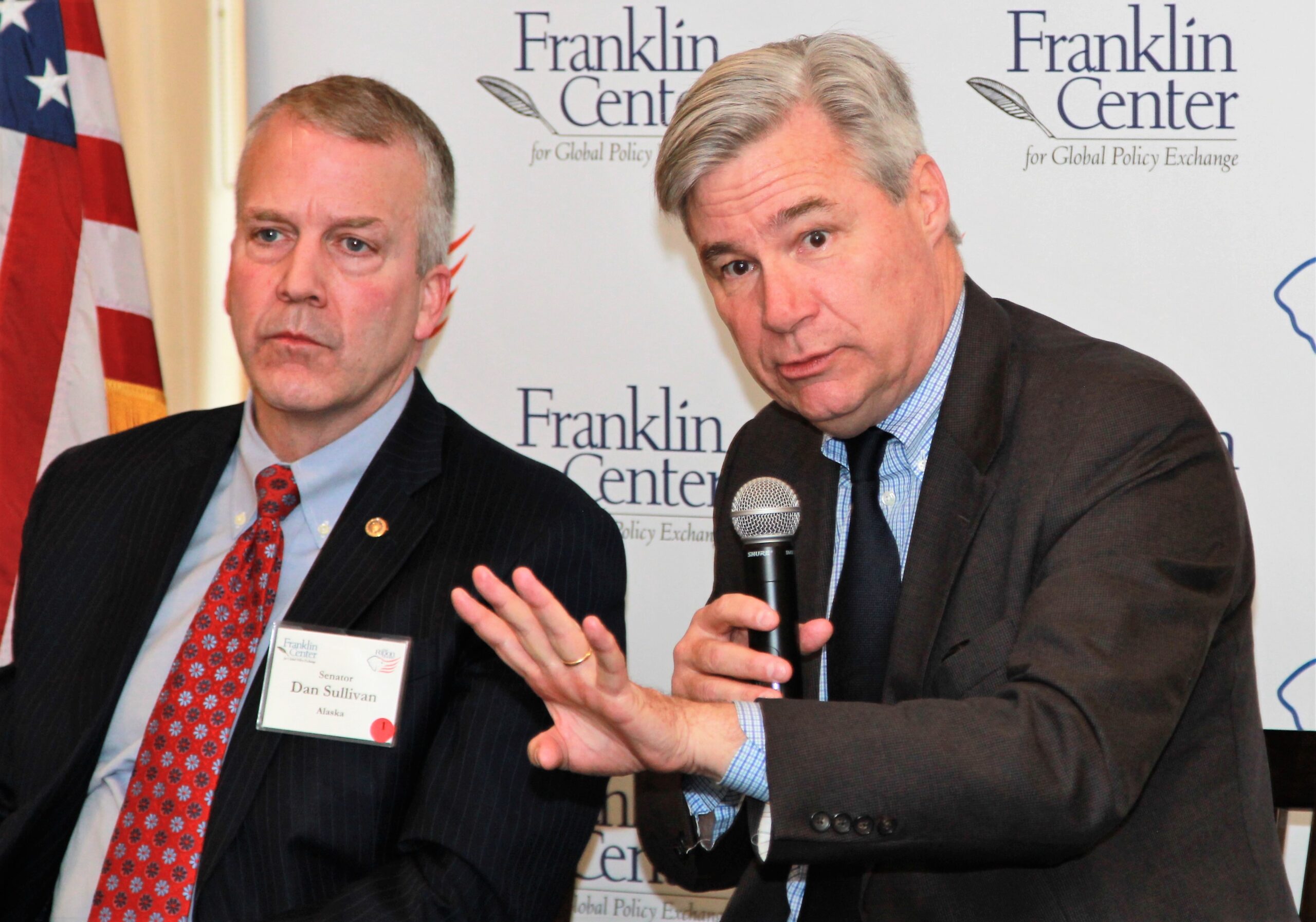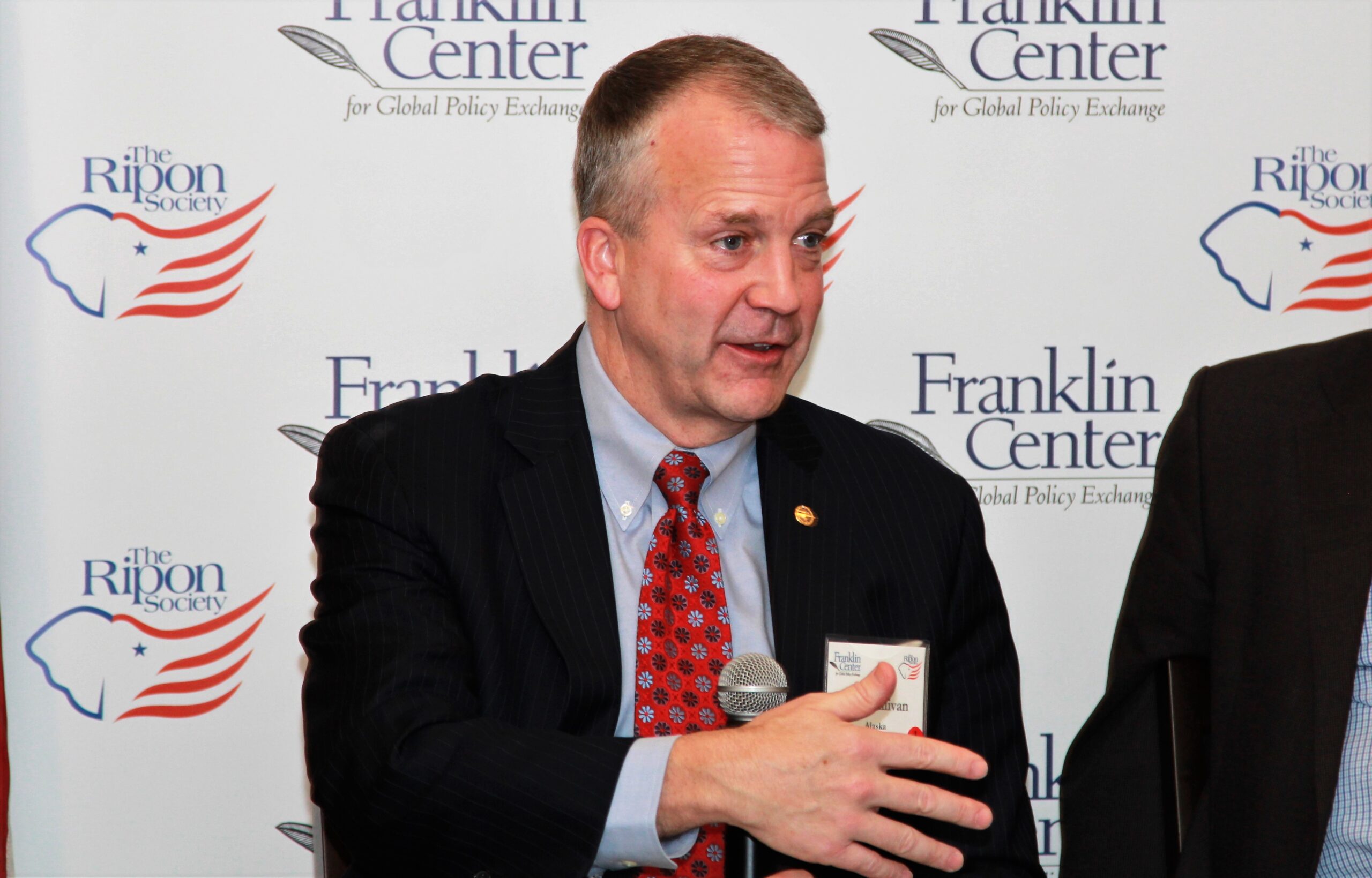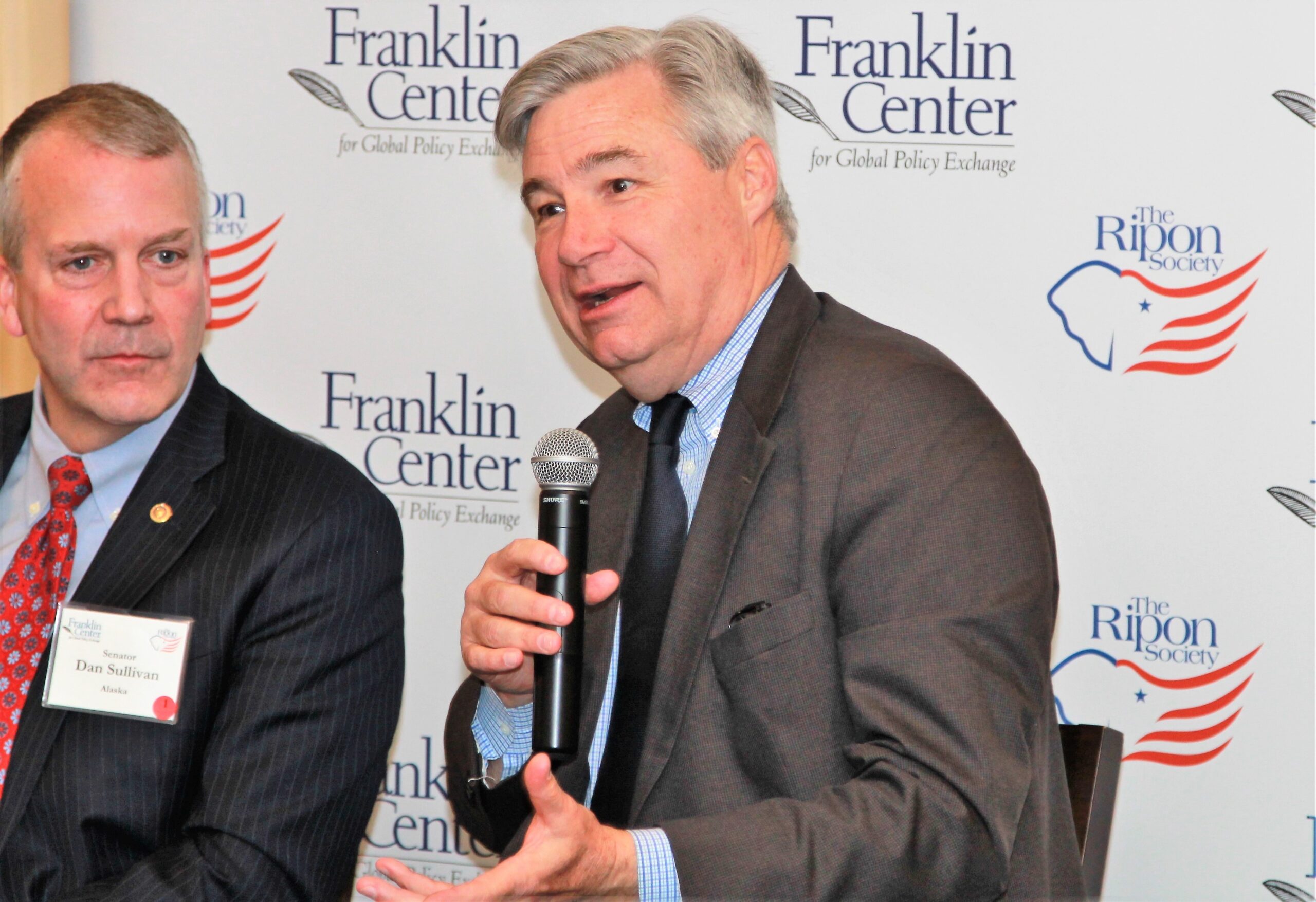 Sullivan & Whitehouse Come Together in Effort to Clean the Oceans of Plastic and Other Debris
Sullivan & Whitehouse Come Together in Effort to Clean the Oceans of Plastic and Other Debris
WASHINGTON, DC – There’s an old saying in Washington that politics stops at the water’s edge when it comes to foreign affairs.
That same saying could be used in an equally fitting but much more literal way to describe the work being done by U.S. Senators Dan Sullivan and Sheldon Whitehouse to clean up the tons of plastic and other debris that have been dumped in oceans around the world.
Sullivan is a Republican from Alaska. Whitehouse is a Democrat from Rhode Island. Both appeared yesterday morning before a breakfast meeting of The Ripon Society and Franklin Center for Global Policy Exchange to discuss the bill they authored to achieve that goal, and the support that exists for the effort from members of both political parties.
“I’ve been in the Senate a little over four years,” Sullivan stated in remarks to open the discussion. “And you know, you read in the press there’s no bipartisanship, nothing gets done, and that the D’s and R’s hate each other. At least in my experience, that is just not true at all. And this is a great example.”
The legislation is called the Save Our Seas Act. It would boost the federal government’s domestic and international response to the millions of tons of plastic waste and other garbage that litter our shores and pollute our oceans, endanger wildlife, and disrupt commerce. The measure was passed by unanimous consent in the Senate on September 26th of last year, and was unanimously approved by the House the next day.
President Trump signed the measure into law on October 11th in a small Oval Office ceremony that, Sullivan said, was originally intended to be private, but became public once the President learned more about the bill. “The President got so excited about what we were up to and passionate about it,” the Alaska lawmaker recounted. “He just said, ‘Bring in all the press!’ So all of a sudden, this bill signing was live on CNN, live on Fox. And it was a really good event.”

According to Sullivan, the President’s enthusiasm reflects the general support his Administration is showing toward the issue and the bill.
“They’re doing a lot right on this,” he stated. He added that both he and Whitehouse “had pressed Ambassador Lighthizer to include the ocean debris issues into the new trade agreements. There’s actually a section in the new NAFTA on this issue, and that was something we had been encouraging.”
Sullivan also had praise for the private sector, which has established a coalition to address the crisis, and pledged over a billion dollars in funding, as well.
“I think it’s now 40 major companies,” Sullivan said of the coalition. “They’ve pledged $1.5 billion to work on this … We’re making good progress. We’ve got the alignment of all the key stakeholders, including the President of United States.”
Whitehouse agreed.
“The Administration seems to be paying quite a lot of attention to this,” he stated. “This is a solvable problem. There are 10 rivers around the globe that put about 90% of this stuff into the sea, and there are five Asian nations that are responsible for more than half of it. And what they’re doing wrong is not having grown-up, acceptable upland waste management infrastructure.
“If we could make them — as a condition of trading with the United States — have to upgrade their waste management infrastructure to real-world standards, guess who would benefit from that? American waste management companies, who would have huge new markets to go to. So there is a real win-win that is happening here.”

Whitehouse also commended the work of the private sector in addressing the problem, and signaled out the efforts of former Democratic Congressman Cal Dooley, who postponed his retirement as President & CEO of the American Chemistry Council in order to lend a hand.
“They’ve been terrific partners,” Whitehouse said of Dooley’s group. “One of my favorite documents ever was the American Chemistry Council announcement that he was staying on so that he can work on marine plastic debris because that’s such a vital issue. And then Cal’s statement was, ‘I’m so glad to be staying on because I’m determined to work on plastic debris because it’s such a big issue.’ It was like, ‘Yes, thank you — you are on message. I love it!’
The good messaging and cross-the-aisle collaboration aside, Whitehouse closed his remarks on a cautionary note:
“This can’t be one of those issues where we celebrate our bipartisanship without testing it against real results,” he stated bluntly. “When you go to the bottom of the Marianas Trench and find creatures that never see daylight with their little bellies stuffed with micro plastic so that it inhibits their ability to feed. When you see whales stranded ashore with 88 pounds of plastic in their stomach. When you see that it’s so embedded that you find micro plastic residue in beer after all the treatment that it has been through.
“It’s just everywhere. It’s in our fish. It’s in our oysters. It’s in everything. We really have to get after this in a very, very serious way. Otherwise, future generations are going to look back at this residue — still kicking around, because it’ll last forever — and they’re going to say, ‘What the hell went wrong with those people in that generation that they let this happen and then didn’t do anything about it to stop it?’”
Following their remarks, the Senators were asked a number of questions, including one about how the debris crisis is affecting their respective coastal states.
Whitehouse answered first.
“One of the things we do in Rhode Island is have annual beach cleanups,” he said. “You go and pick up all the plastic refuse that washed to shore off the beaches. That’s Beach Cleanup Day in Rhode Island. What I learned from that first hearing is that in Dan’s state, they don’t do this with trash bags. They are in the tons-per-mile-of-plastic-waste-on-the-beaches category, which we don’t have to live with because we’re not in a Pacific state. It takes barges and helicopters and front end loaders and specialized and trained people and equipment to clear Dan’s beaches.”
Sullivan concurred.
“Alaska has more coastline than the rest of the lower 48 states combined,” he said. “So when we talk about the plastic debris coming from Asia, the way the currents are, tons of it washes up on the shores in my state. So it’s a humongous problem. But again, it’s a solvable problem. I think that’s the takeaway that we want to leave with all of you. There’s a lot of important work being done, and I think getting the stakeholders, industry and all the big environmental groups aligned — which they are — on this is really important. It is one of the reasons we’re optimistic about it.”
The Senators were also asked about follow-up legislation they are in the process of writing – tentatively titled Save Our Seas 2.0 – and when they expected to introduce the bill.
“We intend to get this legislation out by the end of this month and really make a big push on the legislative side,” Sullivan stated, adding that one of the goals of the bill is to provide the coalitions and other stakeholders with a vehicle to support.
“What we’re trying to do in this legislation is have a place for all of them to coordinate their efforts,” he said. “There are a lot of groups out there right now. National Geographic has done a great job of highlighting this issue. The American Chemistry Council has done a great job. The alignment is really starting to happen.”
“The other element we have it in our legislation is the idea of creating an innovation prize … If you are able to create a plastic bottle, for example, that gets discarded in the ocean. If you can create the chemical processes where that fully biodegrades, that would be a huge boon to this problem. Whoever figures that out is going to make billions.”
Whitehouse and Sullivan were also asked whether any outside groups have come out in opposition to their Save Our Seas legislation.
“For a long time,” Whitehouse observed, “I think the Republican Party had a very strong principle that one shouldn’t regulate in the economic space. Price controls, licensing standards, all of that could diminish innovation and so forth. At some point that kind of crept over into, ‘You shouldn’t regulate pollution either.’
“That wasn’t the traditional value, but it kind of has become that. And there’s a whole array of outfits that are designed to do exactly that — to go to bat against whatever progress we’re trying to make and obscure the hands of the people who are behind them. It’s a big infrastructure. And as best as I can tell, none of it is being deployed against this — none of it — which is a really good sign.”
Sullivan said it was good to have the support of the White House, as well.
“He was very passionate, very focused,” Sullivan said, pointing again to the President’s enthusiasm when he signed the Save Our Seas Act into law. And you know, when you run into bureaucratic inertia, it’s always good to be able to trot out a President’s statement. We were standing right next to him when he made it.”
“It is wrong that those countries are turning our beautiful oceans into their landfills,” Whitehouse said, recalling the words of the President himself.
“Yeah, that’s what he said,” Sullivan beamed. “We’ve used that a lot.”
To view the remarks of Sullivan and Whitehouse before the breakfast discussion yesterday morning, please click on the link below:
The Ripon Society is a public policy organization that was founded in 1962 and takes its name from the town where the Republican Party was born in 1854 – Ripon, Wisconsin. One of the main goals of The Ripon Society is to promote the ideas and principles that have made America great and contributed to the GOP’s success. These ideas include keeping our nation secure, keeping taxes low and having a federal government that is smaller, smarter and more accountable to the people.
Founded in 1978, The Franklin Center for Global Policy Exchange is a non-partisan, non-profit 501(c)(3) organization committed to enhancing global understanding of important international issues. The Franklin Center brings together Members of the U.S. Congress and their international parliamentary counterparts as well as experts from the Diplomatic corps, foreign officials, senior private sector representatives, scholars, and other public policy experts. Through regular conferences and events where leading international opinion leaders share ideas, the Franklin Center promotes enlightened, balanced, and unbiased international policy discussion on major international issues.



